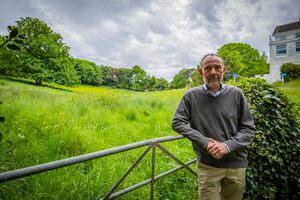A fertile field for debate
Philistines 23: Guernsey Heritage 12. That’s the appropriate epitaph for last week’s debate on the fate of the iconic field at the Princess Elizabeth Hospital.

After two days – yes, two whole days – our action-this-day Assembly finally came up with the answer to two very simple questions.
1. Does additional accommodation for key health workers have to be built within the grounds of the hospital and not on any nearby, brownfield sites?
2. If so, is the green field the only possible site for it? States deputies answered ‘yes’ to both questions and, in order to salve their self-proclaimed but wholly unconvincing green consciences, decided that they would find a brownfield site somewhere, buy it and, instead of building the key worker accommodation on it, would spend money clearing and detoxifying it before sowing it with grass seed. By which time, if there are any cows left in Guernsey, they would be welcome to visit this new field and have a snack.
I know, you don’t need to tell me, we couldn’t make it up. But look, it’s our fault, we voted them in.
The debate provided a fertile field for the Assembly’s bloviators. They needed no second invitation to indulge themselves. It is said that the flatulence of Guernsey cows is contributing to climate change, but many Assembly members seemed determined to prove that anything our cute Daisies and Buttercups can do, they can do more. For the meeting’s last two days, instead of flatulent bovine ruminants, a herd of verbally incontinent bloviators invaded the Assembly and grazed away, idly chewing the cud and emitting enough greenhouse gas to render St Peter Port a no-go area. Speaker after speaker from both sides of the argument revealed a love of the sound of their own voice that I doubt was shared by many of their colleagues. I won’t name them; most are serial offenders. They know who they are, and I trust their colleagues do, too.
One of the Assembly’s newer egotists, while no worse than others in terms of the length and tedium of his speech, did push the boundaries of decency too far for me. He bored us rigid for what seemed an eternity but, not content with that, then voted to prevent anyone else from speaking and, finally, deployed dubious points of order to interrupt any member who had the effrontery to offer an opinion contrary to his own.
The mystifying aspect for me is that few of the bloviators seem to recognise that their bloviating is more likely to alienate their audience than persuade them. I bet that two days of debate didn’t change a single mind or vote, which meant that the fate of the hospital field was inevitably consigned into the hands of the Development & Planning Authority. Judging from the speeches and voting of the D&PA members, I conclude that the field is already doomed.
If the second and third days of the meeting were dire, the first day had brought good news. Two bits of good news, to be precise. Members were invited to approve the restoration of a reciprocal health agreement with the UK. It will partially fill the void left when the UK government unilaterally terminated the previous agreement in 2009. There was some reluctance to concede that this opportunity had arisen only because Brexit had enabled it. The world of Brexit is of course regarded in polite circles, not least amongst the Assembly’s bien pensants, with scorn and distaste. They regard it as an inferior, alien planet inhabited by ignorant oiks such as me, so it was asking a bit too much of them to acknowledge that Brexit could possibly have had any positive outcomes.
Deputy Prow stood to inform the Assembly of the history of the reciprocal health agreement. Jolly decent of him, I thought. After all, it’s always good to know the context. As it turned out, his speech was not so much an altruistic offer to enlighten us as an opportunity to tell us about his own heroic role in the successful outcome. I’m sure we’re suitably grateful to him.
The second bit of good news was that the States, as an employer, is going to be better off to the tune of £9m. each year. A combination of good investment returns and a change to the basis of the States employees’ pension scheme from final salary to career average salary – NB, a change made by the previous Assembly – has left the pension fund in such good health that the States will be making a significantly lower employer’s contribution.
Deputy Dyke, sensing that many members were already thinking of ways to spend the surplus dosh, stood to plead that the bonus should instead be shared with taxpayers in the form of reduced demands on them. Deep breath, everybody.
There was bad news, too. You remember all that stuff about reforming our inefficient government, thereby making substantial savings to the cost of it? Well forget it. Deputy Helyar warned the Assembly that it isn’t going to happen. And he should know.
Before that, deputies Roffey and St Pier found themselves on opposite sides of an argument about waste management charges. This presented something of a nightmare to paid-up members of the Assembly’s ‘Blob’. They had to decide which of their hate figures they disliked least. Surely not all of them could abstain. Deputy Roffey won this time, but I doubt he will get carried away about it.
Deputy St Pier was permitted to put a question under Rule of Procedure 12 to the president of Education, Sport & Culture about the disappointing Ofsted inspection and report into St Sampson’s High School. Inevitably, the ESC president’s response and subsequent questions from the floor led the Assembly into a blame game, or more specifically a deflect-the-blame game.
Some members were keen to rewrite history. The chief minister asked the ESC president if she agreed with him that it was the fault of his and her predecessors. Of course she did. ‘What did they do about it?’ declaimed an indignant Deputy Ferbrache. I thought, blimey, that’s a bit rich coming from those two. Methinks we have a case of short or selective memory here. The previous ESC, in their brief existence of just over two years, inherited the St Sampson’s problem in 2018 from the committee of which Deputy Dudley-Owen was vice-president. The new committee identified the problem and made a plan to transform the school into an aspirational 11-18 school with its own sixth form and under fresh leadership. They secured the support of the States and the funds to finance the plan, only for it to be stopped by the ‘Pause and Review’ requete led by the current ESC president and supported by Deputy Ferbrache himself, at the very point that the transformation was about to begin.
Having been stopped in their tracks, the committee brought forward the planned redeployment of a new head teacher to St Sampson’s and, against professional and political opposition, contracted Ofsted to ensure that in future Guernsey would benefit from a robust system of independent assessment of the quality of education being delivered in our schools.
For those who think that the answer lies in bunging yet more taxpayers’ money at the problem, here’s a thought. It already costs twice as much to educate a pupil inadequately at St Sampson’s High School as it does to educate a pupil excellently at any of England’s best-performing state comprehensive schools. And – as Deputy Inder is prone to say – that’s a fact. (Evidence available on request).
With one predictable exception, all members seemed to have faith in the current head teacher as the best possible person to lead the school through its necessary improvement. I share that faith, but I’m surprised to learn that at the subsequent public meetings held for parents of the school’s students, political members of ESC were conspicuous by their absence. Under the current but outdated Education Law, the committee’s political members are the school’s governing body, directly responsible for its wellbeing. It is inconceivable that in similar circumstances anywhere else in the developed world the governing body of a school would absent itself from such a meeting. What is it that makes Guernsey such an egregious exception?
Oh, I almost forgot; in the absence of the Bailiff and Deputy Bailiff, the meeting was presided over variously by deputies Gollop, Roffey and Trott. This novel experience went well, much to their credit and that of the members who, again with the one usual exception, were on their best behaviour. So it was with much self-congratulation and bonhomie, if not quite in the spirit of harbouring goodwill towards all their parliamentary colleagues, that members finally dragged their crumpled selves out of the clammy heat of the chamber to begin the second summer holidays of their political term. We wish them well, don’t we?

